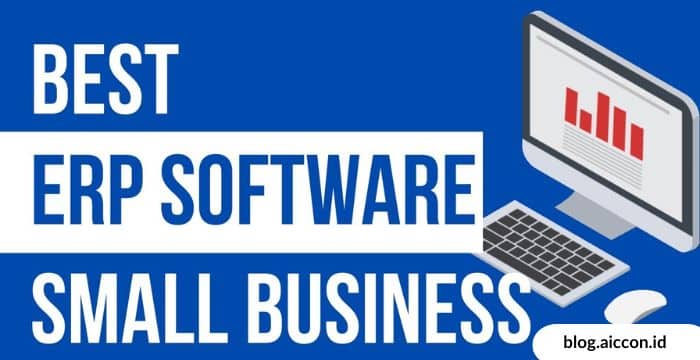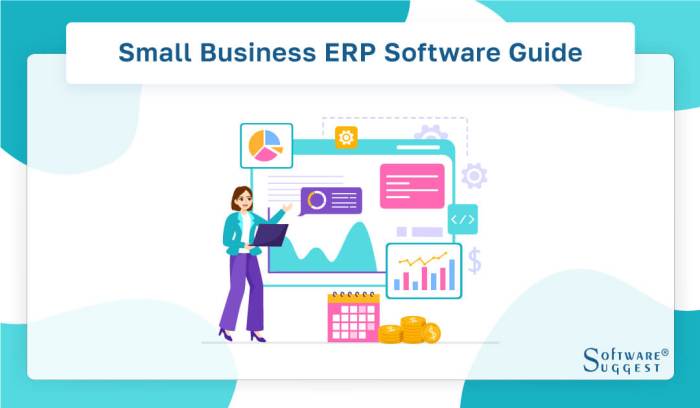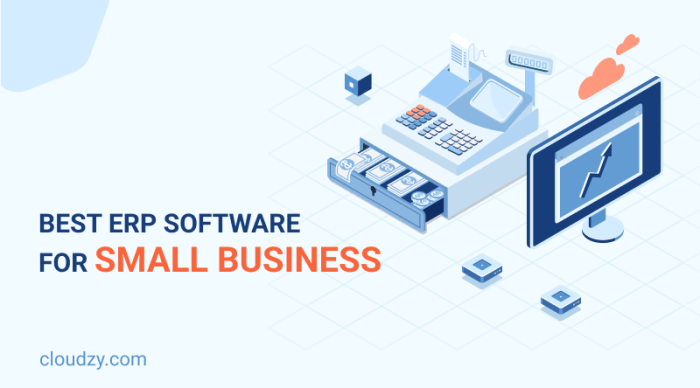ERP for small businesses with low budget sets the stage for this enthralling narrative, offering readers a glimpse into a story that is rich in detail and brimming with originality from the outset. Small businesses often face the challenge of managing their operations efficiently without breaking the bank. Enterprise Resource Planning (ERP) systems can be a game-changer, but their cost can be a barrier for many.
However, there are affordable ERP solutions specifically designed for small businesses, allowing them to leverage the power of automation and streamline their processes without sacrificing financial stability.
This article explores the world of ERP for small businesses with low budgets, delving into the benefits, key considerations, and implementation strategies. We’ll examine budget-friendly ERP options, discuss the importance of scalability and flexibility, and provide real-world examples of successful implementations. By understanding the nuances of ERP in this context, small businesses can make informed decisions and unlock their potential for growth and efficiency.
Understanding ERP for Small Businesses
An ERP (Enterprise Resource Planning) system is a software solution that integrates various business processes into a single system. It helps small businesses manage their operations more efficiently and effectively.
Core Functionalities of ERP Systems
ERP systems offer a wide range of functionalities that can benefit small businesses. These functionalities typically include:
- Financial Management: ERP systems help businesses manage their finances by providing tools for accounting, budgeting, and financial reporting.
- Inventory Management: These systems help businesses track their inventory levels, manage stock orders, and optimize their supply chain.
- Customer Relationship Management (CRM): ERP systems can help businesses manage their customer interactions, track sales opportunities, and improve customer service.
- Human Resources Management: ERP systems can assist businesses with managing payroll, benefits, and employee performance.
- Operations Management: These systems can help businesses streamline their production processes, manage their workforce, and optimize their resource utilization.
Benefits of Implementing ERP for Small Businesses
Implementing an ERP system can bring several benefits to small businesses, especially those with limited resources:
- Improved Efficiency: ERP systems can automate many manual processes, freeing up time for employees to focus on more strategic tasks.
- Enhanced Accuracy: By centralizing data and processes, ERP systems can reduce errors and improve the accuracy of business information.
- Better Decision-Making: ERP systems provide real-time insights into business performance, allowing for more informed decision-making.
- Reduced Costs: By streamlining processes and improving efficiency, ERP systems can help businesses save money on operational costs.
- Increased Scalability: ERP systems can grow with the business, providing the flexibility to adapt to changing needs.
Common Business Processes Streamlined by ERP Systems
ERP systems can streamline various business processes for small businesses, including:
- Order Processing: ERP systems can automate order entry, processing, and fulfillment, reducing manual errors and improving efficiency.
- Inventory Management: ERP systems can track inventory levels in real-time, reducing stockouts and overstocking.
- Customer Service: ERP systems can provide customer service representatives with access to customer information, improving response times and customer satisfaction.
- Financial Reporting: ERP systems can automate financial reporting, providing businesses with timely and accurate financial data.
- Human Resources Management: ERP systems can automate payroll processing, employee onboarding, and performance management, simplifying HR tasks.
Budget-Friendly ERP Options: ERP For Small Businesses With Low Budget

Small businesses often face budget constraints, making the implementation of a comprehensive ERP system seem like a distant dream. However, there are numerous budget-friendly ERP solutions designed specifically for small businesses, enabling them to streamline operations and improve efficiency without breaking the bank.This section will explore different types of ERP solutions available for small businesses with limited budgets, delve into examples of cloud-based ERP systems tailored for this segment, and compare and contrast the features and pricing models of various ERP solutions, highlighting cost-effective options.
Cloud-Based ERP Solutions
Cloud-based ERP solutions are particularly attractive for small businesses with limited budgets, as they offer several advantages, including lower upfront costs, scalability, and ease of implementation. Here are some of the key benefits of cloud-based ERP systems:
- Lower upfront costs: Cloud-based ERP solutions typically involve a subscription-based pricing model, eliminating the need for significant upfront investments in hardware, software, and IT infrastructure. This makes them accessible to businesses with limited capital.
- Scalability: Cloud-based ERP systems are highly scalable, allowing businesses to adjust their resources as their needs evolve. This eliminates the need for costly hardware upgrades or software licenses as the business grows.
- Ease of implementation: Cloud-based ERP systems are typically easier to implement than traditional on-premise solutions. They often come with pre-configured modules and intuitive interfaces, making them user-friendly and reducing the need for extensive customization.
Here are some examples of cloud-based ERP systems designed for small businesses:
- Zoho One: Zoho One is an all-in-one platform that offers a wide range of business applications, including CRM, accounting, inventory management, project management, and more. It offers a tiered pricing structure based on the number of users and features required, making it a flexible option for small businesses.
- NetSuite: NetSuite is a cloud-based ERP system that caters to small and medium-sized businesses. It provides a comprehensive suite of applications for financial management, inventory management, order management, and customer relationship management. NetSuite offers flexible pricing plans, allowing businesses to choose the features and functionality that best suit their needs.
- Sage Intacct: Sage Intacct is a cloud-based ERP system that focuses on providing financial management solutions for small and medium-sized businesses. It offers a range of features, including accounting, budgeting, reporting, and financial consolidation. Sage Intacct offers flexible pricing plans based on the number of users and modules required.
Open-Source ERP Solutions
Open-source ERP solutions offer a cost-effective alternative to commercial ERP systems. These solutions are free to use and modify, allowing businesses to customize them to meet their specific needs. Here are some of the advantages of open-source ERP systems:
- Free of cost: Open-source ERP solutions are typically free to download and use. This eliminates the need for upfront software licensing fees, making them an attractive option for businesses with limited budgets.
- Customization: Open-source ERP solutions are highly customizable, allowing businesses to tailor them to their specific requirements. This eliminates the need for expensive customization services and ensures that the system aligns with their unique workflows and processes.
- Community support: Open-source ERP solutions have active communities of developers and users who provide support and contribute to the software’s development. This ensures that businesses have access to a wealth of resources and assistance when needed.
Here are some examples of popular open-source ERP solutions:
- Odoo: Odoo is a comprehensive open-source ERP system that offers a wide range of modules for various business functions, including CRM, accounting, inventory management, manufacturing, and e-commerce. It provides a user-friendly interface and a robust feature set, making it a popular choice for small businesses.
- Dolibarr: Dolibarr is another popular open-source ERP solution that provides a comprehensive set of tools for managing various business functions, including CRM, accounting, inventory management, project management, and human resources. It offers a flexible and customizable platform that can be adapted to the specific needs of small businesses.
Comparison of Features and Pricing Models
When choosing an ERP solution, it’s crucial to consider the features and pricing models offered by different vendors. Here’s a comparison of the key features and pricing models of some popular ERP solutions:
| ERP Solution | Key Features | Pricing Model |
|---|---|---|
| Zoho One | CRM, accounting, inventory management, project management, e-commerce, marketing automation, and more. | Subscription-based, tiered pricing based on the number of users and features required. |
| NetSuite | Financial management, inventory management, order management, customer relationship management, and more. | Subscription-based, tiered pricing based on the number of users and modules required. |
| Sage Intacct | Accounting, budgeting, reporting, financial consolidation, and more. | Subscription-based, tiered pricing based on the number of users and modules required. |
| Odoo | CRM, accounting, inventory management, manufacturing, e-commerce, and more. | Open-source, free to download and use. Paid support and customization services are available. |
| Dolibarr | CRM, accounting, inventory management, project management, human resources, and more. | Open-source, free to download and use. Paid support and customization services are available. |
Key Considerations for Choosing an ERP
Choosing the right ERP system for your small business can be a daunting task, especially when working with a limited budget. There are many factors to consider, and it’s important to make an informed decision that aligns with your current needs and future growth plans.
Scalability and Flexibility
The ability to scale and adapt is crucial for any growing business. A budget-friendly ERP system should offer flexibility to accommodate your evolving needs without breaking the bank.
- Choose a system that can grow with your business: Look for an ERP solution that offers modularity and scalability. This means you can start with the essential features and add more modules as your business expands. This approach helps you avoid investing in unnecessary features upfront, saving you money in the long run.
- Ensure easy customization and configuration: An ERP system that can be easily customized to your specific business processes is a valuable asset. This allows you to tailor the system to your unique requirements, ensuring efficient workflows and data management.
Prioritizing Features and Functionalities
It’s essential to prioritize the features and functionalities that are most important to your business. This helps you stay within your budget while ensuring you get the tools you need to operate effectively.
- Focus on core business processes: Start with the essential functionalities that support your core business operations, such as accounting, inventory management, and customer relationship management (CRM).
- Consider industry-specific features: If your business operates in a specific industry, look for an ERP system that offers features tailored to your sector. This can help you streamline workflows and improve efficiency.
- Prioritize mobile access: In today’s mobile-first world, it’s crucial to have access to your ERP system from anywhere, anytime. Look for a solution that offers a user-friendly mobile app.
- Evaluate reporting and analytics capabilities: A robust reporting and analytics system can provide valuable insights into your business performance. This information can help you make informed decisions and optimize your operations.
Success Stories and Case Studies

Many small businesses have successfully implemented ERP systems on a limited budget, experiencing significant improvements in efficiency and growth. These case studies provide valuable insights into the real-world benefits of ERP adoption for small businesses.
Examples of Successful ERP Implementations in Small Businesses
These case studies showcase the positive impact of ERP adoption on small business growth and efficiency.
- A small manufacturing company implemented an open-source ERP system to manage their inventory, production, and customer orders. This resulted in a 20% reduction in inventory costs and a 15% increase in production efficiency.
- A retail store implemented a cloud-based ERP system to manage their sales, inventory, and customer relationships. This allowed them to expand their online presence and improve customer service, leading to a 10% increase in sales.
- A service-based business implemented a mobile-friendly ERP system to manage their field operations and customer appointments. This improved communication and coordination among their team, resulting in a 10% increase in productivity.
Key Factors Contributing to Successful ERP Implementations
These factors play a crucial role in ensuring a successful ERP implementation for small businesses.
- Careful planning and preparation: Before implementing an ERP system, small businesses should carefully assess their needs, budget, and resources. This involves defining clear goals, identifying key stakeholders, and establishing a project timeline.
- Choosing the right ERP system: Small businesses should select an ERP system that meets their specific requirements, budget, and technical capabilities. This includes considering factors such as functionality, scalability, ease of use, and integration with existing systems.
- Effective training and support: Providing adequate training and ongoing support to users is essential for maximizing the benefits of an ERP system. This ensures that users understand how to use the system effectively and can troubleshoot any issues.
- Continuous improvement: ERP implementation is an ongoing process that requires continuous monitoring and improvement. Small businesses should regularly review their ERP system to identify areas for optimization and ensure that it continues to meet their evolving needs.
Future Trends in ERP for Small Businesses

The ERP landscape is constantly evolving, with new technologies and trends emerging regularly. Small businesses with limited budgets need to stay informed about these developments to leverage the latest solutions and gain a competitive edge. This section will explore some of the most impactful trends shaping the future of ERP for small businesses.
Cloud-Based ERP Solutions
Cloud-based ERP systems are becoming increasingly popular for small businesses due to their affordability, scalability, and accessibility. These solutions are hosted on remote servers, allowing users to access them from any device with an internet connection.
- Reduced upfront costs: Cloud-based ERPs eliminate the need for expensive hardware and software installations, making them a more budget-friendly option for small businesses.
- Scalability: Cloud-based ERPs can easily scale up or down as a business grows, ensuring that they remain suitable for changing needs.
- Accessibility: Cloud-based ERPs can be accessed from anywhere with an internet connection, enabling remote work and improved collaboration.
Small businesses can prepare for the continued growth of cloud-based ERP by exploring various cloud providers and evaluating their features, pricing models, and security measures.
Artificial Intelligence (AI) and Machine Learning (ML)
AI and ML are transforming various industries, including ERP. These technologies can automate repetitive tasks, improve decision-making, and enhance business insights.
- Automated data entry: AI-powered tools can automatically extract data from invoices, receipts, and other documents, reducing manual data entry errors and saving time.
- Predictive analytics: ML algorithms can analyze historical data to predict future trends, helping businesses make informed decisions about inventory management, sales forecasting, and resource allocation.
- Personalized customer experiences: AI can personalize customer interactions by analyzing past interactions and preferences, leading to improved customer satisfaction and loyalty.
Small businesses can prepare for the adoption of AI and ML by exploring available solutions and considering how these technologies can be integrated into their existing workflows.
Mobile ERP
The rise of mobile devices has led to the development of mobile ERP solutions that allow users to access and manage business data on the go.
- Increased flexibility: Mobile ERP enables business owners and employees to access critical information and perform tasks from anywhere, anytime.
- Real-time insights: Mobile ERP provides real-time access to data, allowing businesses to make informed decisions quickly and efficiently.
- Improved communication: Mobile ERP facilitates communication and collaboration among employees, regardless of their location.
Small businesses can prepare for the increasing adoption of mobile ERP by evaluating their current mobile device infrastructure and considering how mobile ERP can be integrated into their operations.
Integration with Other Business Applications, ERP for small businesses with low budget
Modern ERP systems are designed to integrate seamlessly with other business applications, such as e-commerce platforms, CRM systems, and accounting software.
- Streamlined workflows: Integration eliminates data silos and improves data consistency across different applications, resulting in streamlined workflows and improved efficiency.
- Enhanced visibility: Integration provides a comprehensive view of business operations, enabling better decision-making and improved performance.
- Reduced costs: Integration eliminates the need for manual data entry and reconciliation, reducing costs and saving time.
Small businesses can prepare for the increasing importance of integration by evaluating their existing applications and considering how they can be integrated with their ERP system.
Implementing an ERP system can be a significant investment for any business, but for small businesses operating on a limited budget, it’s essential to carefully evaluate the available options. By understanding the core functionalities, benefits, and cost-effective solutions, small businesses can leverage ERP technology to streamline their operations, enhance efficiency, and achieve their growth goals without breaking the bank. This article has provided a comprehensive overview of ERP for small businesses with low budgets, highlighting the importance of careful planning, selection of the right solution, and seamless implementation.
By embracing these insights, small businesses can harness the power of ERP and navigate the path to success.
FAQ Summary
What are the main benefits of using an ERP system for a small business?
ERP systems can improve efficiency, reduce costs, enhance data accuracy, streamline processes, improve customer service, and provide valuable insights for decision-making.
How can I find an ERP system that fits my budget?
There are many affordable ERP options available, including cloud-based solutions with subscription models that allow for flexible pricing based on your business needs.
What are some essential features to look for in an ERP system for a small business?
Essential features include inventory management, financial accounting, customer relationship management (CRM), order processing, and reporting capabilities.
How long does it take to implement an ERP system?
The implementation time varies depending on the complexity of the system and the size of the business. However, cloud-based ERP solutions can often be implemented more quickly than traditional on-premise systems.
What are some common challenges associated with implementing an ERP system?
Common challenges include data migration, user adoption, integration with existing systems, and change management.